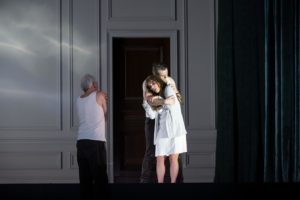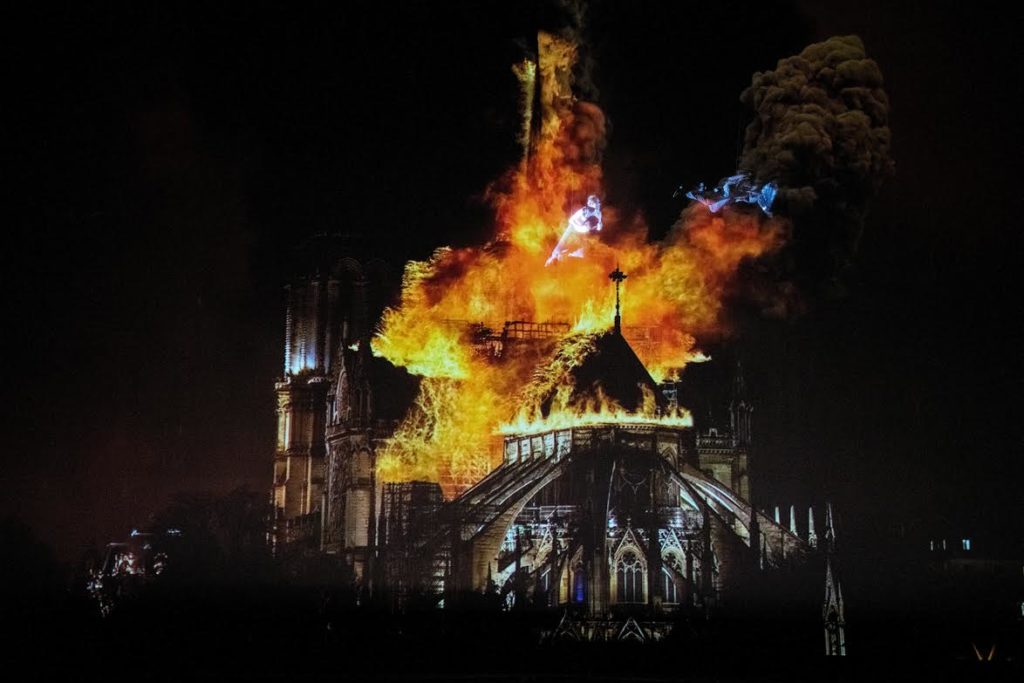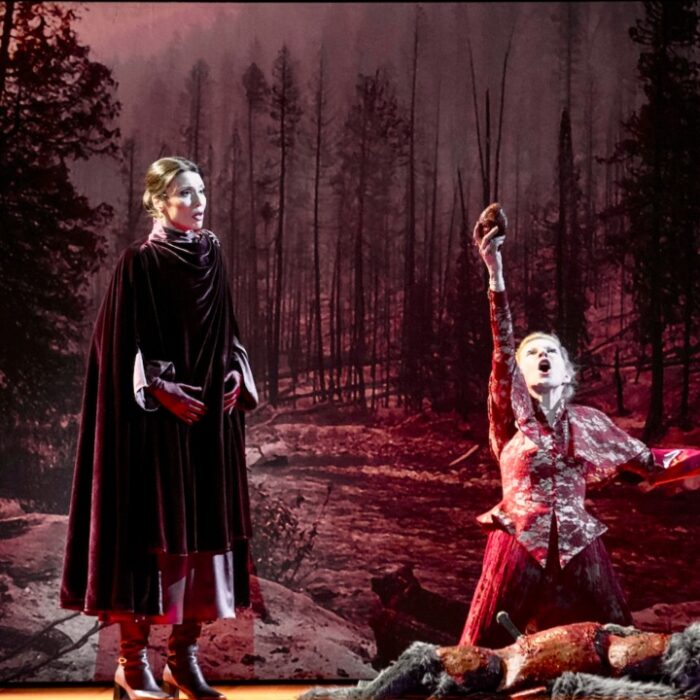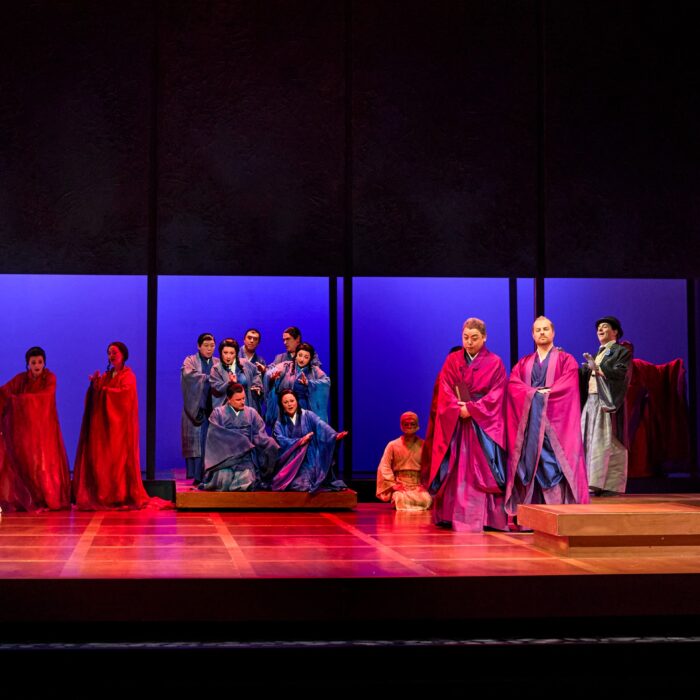
Opéra National de Paris 2020-21 Review: Faust
Benjamin Bernheim & Ermonela Deliver Superstar Quality Performances In ‘Magical’ Production Despite Musical Direction
By Mauricio VillaGounod’s “Faust” is the quintessential French grand opera. It premiered in Paris at the Théâtre Lyrique in 1859, with spoken dialogues and less musical numbers. The opera was an immense success, and up until 1869 it was represented 314 performances. Subsequent changes included recitatives instead of spoken dialogue, an aria for Valentin, and the ballet during the “Walpurgis Night” scene in the fourth act. It has since been performed more than 2,400 times at the Palais Garnier in Paris and inaugurated the Metropolitan Opera House in New York in 1883 with more than 730 performances thereafter at the Met. Although it has lost part of its French opera dominance nowadays (probably to the success of Bizet’s “Carmen”), it is currently still among of the most performed French Operas.
The Opéra National de Paris planned to debut a new production of “Faust” at the Théâtre de la Bastille with a live audience, but due to the restrictions recently implemented by COVID-19, the performances were ultimately canceled (not to mention that the French minister of culture even tested positive for the virus and was hospitalized shortly after attending a private performance).
The company decided instead to record the opera live and screen it on France TV before showing it later in cinemas. The Paris Opera invited OperaWire and other press outlets to the live recording of this opera on March 22, 2021. This review is based on that showcase.
Star Tenor
Star tenor Benjamin Bernheim sang the title role of Faust and it is clear why he was the recipient of the Artiste Lyrique de l’Année in France 2020. His voice is simply a jewel. He possesses a beautiful timbre, a natural vocal emission, solvent high notes, and the ability to create seamless piannisimi and crescendos/diminuendo up to a high C, as he demonstrated in this performance “Salut demeure chaste et pure.” We must add that his French diction is excellent, and it’s a luxury to hear a French tenor in a French Opera.
Moreover, he displayed vocal versatility with the baritonal tessitura of the opening act, never pushing the sound or trying to widen the sound. This created a wondrous dramatic effect on parlatto effect he created on“rien, rien.” He sang his first soaring pianissimo on the line: “ôh! Merveille” when he sees the apparition of Marguerite, a true challenge for most tenors as this line hangs is in the passagio zone where there is a risk that the voice might break while singing softly. Bernheim’s first encounter with Marguerite was tender, sweet, and passionate, softening the sound on the G and F sharp of “ Ne pertmettrez-vous pas,” both in that treacherous passagio zone. He also emitted a perfect mezza voce high B natural on “Je t’aime,” further proving his solid vocal technique.
His interpretation of the aria “Salut demeure et pure” was a lesson in French singing. This is a difficult aria due to the chromatic lines and strange legato writing. And of course, there’s the climactic high C that everyone is waiting for. While most tenors opt to sing that final note forte, or breaking the line up in order to breathe before attacking the C, Bernheim sang the line in one breath making a slight crescendo on the high C.
He kept singing with sweetness and tenderness during the second act duet showcasing more mezza-voce and pianissimo singing. His robust and dramatic vocalitá came to the fore during the duel with Valentin, where he has to sing three B flats, and the Walpurgis night with the line: “Je veux la voir! Viens! Je le veux” which features a lot of high A naturals. He was dramatic as well as remorseful in his recitative during the prison scene, melding his sound comfortably with the soprano and bass during the final duet and trio. His sang the last two high notes of the night, two high B naturals, with squillo, projection, and security.
His incarnation of the Doctor Faust was a bit plain, but I bet it was due to the directing of this production. One of the challenges of this role is playing the older Faust, but in this case it was performed by an old actor, and for the rest of the story he mostly played the ardent loving gentlemen.

The Greatest Singing Actress of Her Generation
Albanian soprano Ermonela Jaho played Marguerite and she was also on a tremendously wonderful level. She is the complete package vocally and dramatically, and in my view, she might just be the greatest singing-actor of our generation. Sure, she possesses a dark harsh sound in the lower/middle register with sparkling high notes, but her vocal interpretations are so powerful and believable, and her technique is so secure that within five minutes you forget about the rawness of her sound and instead allow yourself to be swept up by a combination of musical intelligence and profoundness.
Every heroine she plays becomes special and unique and Marguerite was no exception. Jaho was comfortable with the lower writing of the“Roi de Thule,” using dynamics and coloring her voice to transition seamlessly from telling the story of the Thule king to her own reflections about her encounter with Faust. She shined during the “Jewel Song” with impeccably fast scales, staccato notes, trills, and a bright ringing high B natural at the end.
What was fascinating during the quartet and duet was her ability to provide a clear contrast between her love for Faust, her religious beliefs, and the sadness from of the death of her mother and young sister. She can portray all these emotions not only acting-wise but vocally too. She put her stamp on these scenes with two ringing high Cs during the duet.
In the ensuing Church scene, she was so tense and frightened in the Chuch scene, in shock during Valentin’s death, and viscerally frightening as she drowned her own baby in the bathtub, and psychotic in the last scene. The downward spiral was vividly portrayed both physically and vocally. It is unbelievable how she can use her voice to portray such deeply strong emotions and how moving she can be. I hope that Marguerite becomes one of her signature roles, like Violetta and Cio-Cio San are, because she will only get better and better. And I can’t imagine how much more devastating that would be.
Demonic Bass-Baritone
Bass-baritone Christian Van Horn played the role of Méphistophélès with sinister darkness and total control vocally. He interpolated a high F on his entrance “A vrai gentil home!” He continued proving his solvency in the higher register, as well as his use of mezza voce and pianissimi from there on out, with his “Je ferai de mon mieux pour n’en nuyer personne” sung with an exquisite mysterious mezza voce that was contrasted nicely with the ferocious attack of “Le veu d’or.” So strong was his vocal control, that he survived some impossibly fast tempi imposed by conductor Lorenzo Viotti (more later).
Méphistophélès is a long role with three arias, several ensembles, and long recitatives. His short aria/scene “Il était temps,” an invocation to the night, love, and nature was sung with secure legato and amazing long lines in one breath. The Church scene was terrifying as Van Horn pursued Marguerite relentlessly, finishing with a chilling raw high F sharp.
His fourth act aria “Vous qui faites l’endormie” demands long legato phrases in a high tessitura between C and E natural. Van Horn was comfortable enough not only to sing the music as written but also added some bite and sarcasm that the piece demands. All in all, he was an excellent Mephisto, acting with a very diabolic quality and a touch of irony and sarcasm; he was never afraid of pushing the limits, but never fell into caricature or overacting.
Florian Sempey, a regular at Paris Opera, played Marguerite’s brother Valentin. The score is quite affordable for any baritone with very central writing, reaching high F sporadically ( a comfortable note for a baritone). But it is in the aria “Avant de quitter ces lieux” where all the difficulties appear. Not only is the tessitura is really high, with three ascensions to high G and sustained lines around E and F, but it demands soft singing and legato lines in this uncomfortable vocal zone. Sempey gave an outstanding rendition of the aria, emitting all the high notes effortlessly and in perfect style. He played his death scene movingly and menacingly as he curses Marguerite.
Mezzo-soprano Michèle Lousier sang the role of Siebel. She posses a bright soprano timbre which suited the naïve teenager character. She gave a lively and legato interpretation of “Faites lui mes aveux.”
A Messy Reading
Italian conductor Lorenzo Viotti was in charge of the Paris Opera Orchestra. If I had to recap his reading of the score it would be: extremely fast. As often happens with all the standard repertory operas, tempi have been imposed by tradition, therefore all conductors play more or less in the same timing. But I had the impression that Viotti was in a hurry to end the evening earlier. His most extreme tempi came during Méphistophélès’s first aria (as mentioned), the chorus that opens the second scene of Act one, the Waltz of the first Act, the trio between Valentin, Mephisto, and Faust where he did not respect the two ritardando that precede the tenor’s two high B flats; the few scenes that were played of the Walpurgis night (which was drastically cut) and the final duet and trio. In essence, most of the opera came off as hurried and, often, teetering on chaos.
He did, at least, create some contrast by playing the whole garden scene, the first scene of the third act, and Mephistophélès’ last aria with more relaxed tempi, but I consider that it was a risk to choose to make such a big contrast in tempi because it created the sense of a disorganized and indecisive reading; a Frankenstein “Faust” if you will.
That was further accentuated by his inability to find a balance between bright and strong orchestra sound in the pit and the sounds on stage. Every single voice was completely covered by the orchestra at some point or another. One might imagine that since there won’t be any public performances, sound engineers will balance the sound for the stream.
The Paris Opera Chorus was excellent, particularly during “Gloire immortelle de nos aieux.”

Magic
The new production was directed by German auteur Tobias Kratzer. He chose to transpose the work to modern Paris, rather than in a German Village and showcased hyper-realistic sets. The opera combined the scenery with big projections, some of them recorded live with cameras. For example, we saw Marguerite trying the jewels in her bathroom during her famous aria. The whole church scene happens at the Paris Metro, and Marguerite drowned her baby in a bathtub during the Walpurgis night music. This last scene was particularly morbid, chilling, and effective. We see Marguerite visit the gynecologist when she is pregnant in Act four and are even shown the ultrasound echography projected on the front cloth.
There are also some magical effects like Faust and Mephisto flying over Paris (real extras doubling the characters and hang on cables) landing on Notre Dame balustrade, or flying again over Notre Dame in flames, a reference to the 2019 fire. We even see some references to the pandemic with some images of the restriction on the metro seats.
Of course, as often happens with modern productions, there are some contradictions with the libretto. For example, Valentin’s first scene is set on a Basketball field and the Waltz in a Disco.
Ultimately, the production was meaningful, beautiful, effective, modern, and magical. The characterization and directing of all the roles were believable and strong, except the role of Faust which felt like it lacked depth. But none of that mattered in the hands of one of the best casts I have seen in this opera.



